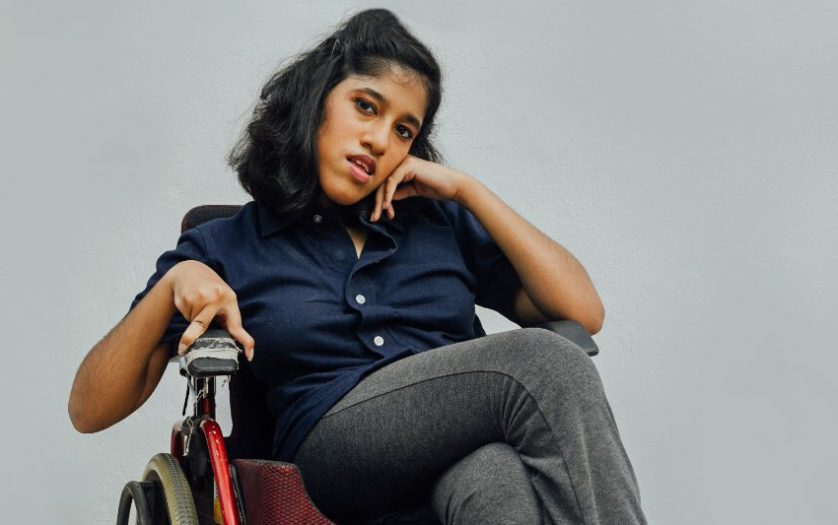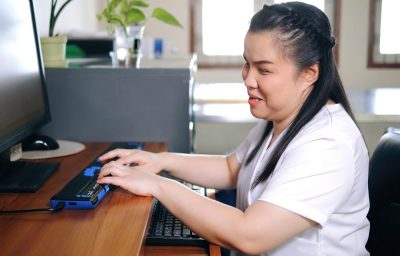
Ivanna Nehanda Tara, 17, loves fashion and taking selfies with her sister, Rheanna Deandra Tara, 19.
However, changing outfits is not easy for Ivanna, who has cerebral palsy.
“Ivanna loves being fashionable. However, due to the difficulty of dressing up, she resorts to wearing baggy clothes. Her condition has impacted her ability to do various daily tasks on her own. She struggles with mobility in her right arm and in both legs,” said Usha Nair, Ivanna’s mother.
People with disabilities want to be like everyone else and wear clothes that are trending, Usha added.
“They need to be able to express themselves through fashion without having to worry about their disability ‘getting in the way’,” said Usha, 52, who left her job as a public relations manager in a financial institution to care for her daughter. “I have struggled to find clothing for Ivanna off-the-rack in department stores. Some dresses are designed in such a way that she can’t even slip them on her body.”
As Ivanna grew older, Usha decided to design adaptive apparel to suit her daughter’s needs. Adaptive apparel is clothing, garments and footwear specifically designed for senior citizens, people with disabilities, and people with limited mobility.
Usha soon came up with a line of magnetic button polo T-shirts under the name “Dawn Adaptive.”
Ivanna’s maternal grandmother, Padmavathi Nair, 79, invested her own money to help kick-start the business.
Usha didn’t have any previous experience in the fashion industry, so she partnered with Bernard Nathan, owner of a talent company that employs models with disabilities, and who has a disability himself.
“Bernard is diagnosed with spinal muscular atrophy and understands the struggles people with physical limitations face when it comes to dressing up. I also scoured the Internet and communicated with physiotherapists working with people with physical disabilities,” said Usha.
To ensure due diligence, Usha also conducted a survey of 60 people with different physical abilities.
“We listened to their wants and needs – including material, price point and design – in creating the outfits. After some contemplation, we opted for polo T-shirts because they can be worn for leisure and semi-formal events.”
“For the magnetic buttons, we did a lot of research and development to find the right strength. We also tested them with people with dexterity issues to ensure they could wear and take off the T-shirt easily,” shared Usha, who plans to also offer pants, jumpsuits and children’s clothing for people with disabilities.
The World Bank reports that one billion people, or 15% of the world’s population, experience some form of disability in the entire world.
The number of registered persons with disabilities (PWDs) under the Social Welfare Department in 2017 was 453,258. From this figure, PWDs in the physical disability category recorded the highest number at 35.2%.
Last year, Associate Professor Dr. Nazlina Shaari, from Universiti Putra Malaysia, won a gold medal at the Malaysian Technology Expo for designing adaptive apparel for seniors with disabilities.
Last month, Social Security Organisation (Socso) collaborated with local designer Nurita Harith to create baju Melayu and baju kurung as functional adaptive clothing.
Usha is overjoyed that Ivanna is relishing her independence and regaining her confidence.
“Adaptive clothing gives a psychological boost to people with limited mobility. There is a psychological term called ‘enclothed cognition’, which is the systematic influence that clothes have on the wearer’s psychological processes. This feeling is felt by everyone, whether you have a disability or not,” she said.
Usha strives for constant engagement with people with disabilities, working with PWDs for the clothing’s graphic designs and in the company’s accounting department. Her in-house graphic designer is also a person with a disability.
“We also give opportunities to PWDs and parents of children with disabilities to sell our products. They dropship our products and earn commission by doing so.”
“We have also collaborated with other small businesses, especially with families with disabilities. We believe this initiative can empower them and at the same time, we can reach out and expand our network to the people who matter most,” said Usha.








